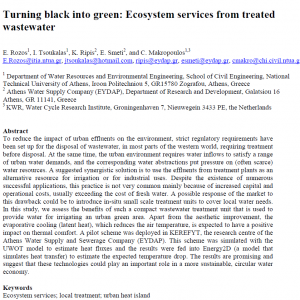Open Access: Turning black into green: Ecosystem services from treated wastewater

- Version Final draft
- Download 1908
- File Size 640 KB
- File Count 1
- Create Date March 8, 2018
- Last Updated March 8, 2018
- Download
Abstract: To reduce the impact of urban effluents on the environment, strict regulatory requirements havebeen set up for the disposal of wastewater, in most parts of the western world, requiring treatment before disposal. At the same time, the urban environment requires water inflows to satisfy a range of urban water demands, and the corresponding water abstractions put pressure on (often scarce) water resources. A suggested synergistic solution is to use the effluents from treatment plants as an alternative resource for irrigation or for industrial uses. Despite the existence of numerous successful applications, this practice is not very common mainly because of increased capital and operational costs, usually exceeding the cost of fresh water. A possible response of the market to this drawback could be to introduce in-situ small scale treatment units to cover local water needs. In this study, we assess the benefits of such a compact wastewater treatment unit that is used to provide water for irrigating an urban green area. Apart from the aesthetic improvement, the evaporative cooling (latent heat), which reduces the air temperature, is expected to have a positive impact on thermal comfort. A pilot scheme was deployed in KEREFYT, the research centre of the Athens Water Supply and Sewerage Company (EYDAP). This scheme was simulated with the UWOT model to estimate heat fluxes and the results were fed into Energy2D (a model that simulates heat transfer) to estimate the expected temperature drop. The results are promising and suggest that these technologies could play an important role in a more sustainable, circular water
economy.
| File | Action |
|---|---|
| Turning black into green Rozos_2017_DESW.pdf | Download |